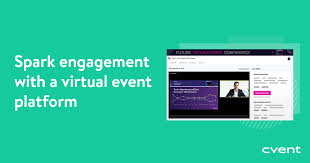The Rise of Virtual Event Platforms: Revolutionizing the Way We Connect
In today’s fast-paced digital world, virtual event platforms have emerged as game-changers, revolutionizing the way we connect, engage, and collaborate. With the global pandemic forcing a shift away from traditional in-person events, these platforms have become essential tools for businesses, organizations, and individuals to host successful events in a virtual environment.
So, what exactly is a virtual event platform? It is an online software solution that enables the creation and hosting of various types of events virtually. These platforms provide a wide range of features and functionalities that mimic the experience of attending an in-person event. From conferences and trade shows to webinars and workshops, virtual event platforms offer a versatile solution for hosting engaging and interactive events.
One of the key advantages of virtual event platforms is their accessibility. Participants can join from anywhere in the world with just an internet connection. This eliminates the need for travel expenses and logistical challenges associated with physical events. Attendees can simply log in from their homes or offices, saving time and money while still benefiting from valuable networking opportunities.
Engagement lies at the heart of any successful event, and virtual event platforms excel in this aspect. They offer interactive features like live chat rooms, Q&A sessions, polling, and networking lounges that facilitate meaningful connections between participants. Additionally, these platforms often provide analytics tools that allow organizers to track attendee engagement levels and gather valuable data for future improvements.
Moreover, virtual event platforms enable seamless content delivery. Presentations can be streamed live or pre-recorded for on-demand viewing. Exhibitors can showcase their products or services through virtual booths equipped with multimedia content such as videos, brochures, and live demos. Attendees can access this content at their convenience throughout the duration of the event.
With advanced technology integration, virtual event platforms also support immersive experiences like 3D environments or augmented reality (AR) elements. These features create a more engaging and memorable experience for participants, leaving a lasting impression long after the event concludes.
Security and privacy are paramount in the digital realm, and virtual event platforms prioritize these concerns. Robust security measures are implemented to protect sensitive information and ensure a safe environment for all participants. Features like password-protected sessions, data encryption, and secure payment gateways provide peace of mind to organizers and attendees alike.
As we navigate through uncertain times, virtual event platforms have proven their worth by offering an effective alternative to traditional events. They have not only bridged the physical gap but also opened up new possibilities for global collaboration and knowledge sharing.
In conclusion, virtual event platforms have transformed the landscape of events by providing accessible, engaging, and secure environments for participants worldwide. With their wide array of features and capabilities, these platforms have become essential tools for organizations seeking to connect with their audiences in a meaningful way. As technology continues to advance, we can expect virtual event platforms to evolve further, delivering even more immersive experiences that redefine the future of events.
7 Frequently Asked Questions About Our Virtual Event Platform
- What features does your virtual event platform offer?
- How secure is your virtual event platform?
- What type of support do you provide for the virtual event platform?
- How easy is it to set up and manage a virtual event on your platform?
- Can I customize my virtual event experience on your platform?
- What pricing options are available for using the virtual event platform?
- Are there any limits to the number of attendees or events that can be hosted on the virtual event platform?
Event registration and ticketing: Our virtual event platform offers a comprehensive suite of features for event registration and ticketing, including the ability to create custom registration forms, set up automated payment processing, and generate unique tickets for each attendee.
Event management: Our platform provides a range of tools to help you manage your virtual events, including the ability to create detailed agendas with session descriptions and speaker bios, assign tasks to team members, and track attendance.
Live streaming: Our platform supports live streaming of your events, allowing you to broadcast content directly from your website or social media channels. We also provide real-time analytics so you can measure engagement during the event.
Networking & engagement: Our platform includes a range of features designed to facilitate networking and engagement between attendees, including private messaging, video chat rooms, polls and surveys, Q&A sessions, and more.
5. Analytics & reporting: We offer comprehensive analytics and reporting tools that allow you to measure the success of your virtual events over time by tracking key metrics such as attendance rates, engagement levels, conversion rates, etc.
The security of any virtual event platform depends on the specific platform you are using. It is important to research and understand the security measures in place before selecting a platform, as well as any additional security options that may be available. Generally speaking, most virtual event platforms use industry-standard encryption protocols, secure data storage, and authentication methods to protect user data and ensure that all communications are secure.
At Haaga Exhibits, we provide comprehensive support for virtual event platforms to ensure a seamless and successful experience for our clients. Our support services include:
- Consultation: We offer consultation services to understand your specific event requirements and help you choose the right virtual event platform that aligns with your goals and objectives. Our team of experts will guide you through the selection process, considering factors such as audience size, event type, budget, and desired features.
- Setup and Configuration: Once you have chosen a virtual event platform, we assist in setting up and configuring the platform according to your specific needs. Our team will work closely with you to customize the platform’s branding, layout, registration process, and other essential elements to create a tailored experience for your attendees.
- Training: To ensure that you are fully equipped to utilize the virtual event platform effectively, we provide training sessions for both organizers and participants. Our training covers various aspects of the platform, including navigating the interface, managing sessions or booths, engaging with attendees, and utilizing interactive features.
- Technical Support: During your virtual event, our technical support team is available to address any issues or concerns that may arise. Whether it’s troubleshooting technical difficulties or providing guidance on using specific features of the platform, our experts are just a call or message away.
- Onsite Assistance: For larger events or those requiring additional support, we offer onsite assistance from our experienced team members. They will be present at your venue to oversee the setup of equipment, troubleshoot any technical issues that may arise during the event, and provide immediate assistance to ensure a smooth experience for both organizers and attendees.
- Post-Event Evaluation: After your virtual event concludes, we conduct a post-event evaluation to gather feedback from organizers and participants about their experience with the virtual event platform. This valuable feedback helps us identify areas of improvement and further enhance our support services.
Our goal is to provide end-to-end support for virtual event platforms, ensuring that you have a successful and impactful event. From initial consultation to post-event evaluation, we are committed to being your trusted partner throughout the entire process.
Our virtual event platform is designed to be user-friendly and intuitive, so it’s easy to set up and manage a virtual event. All you need to do is create an account, select the type of event you’re hosting, customize the look and feel of your event page, add any necessary content such as videos or images, and then launch your event. Our platform also offers a range of features that allow you to manage your virtual event with ease, such as the ability to track registrations, create polls and surveys, monitor attendance in real-time, manage speakers and presentations, and more.
Absolutely! Our virtual event platform is designed to offer a high level of customization, allowing you to tailor your event experience to meet your specific needs and branding requirements.
Here are some of the ways you can customize your virtual event on our platform:
- Branding: You can incorporate your organization’s branding elements such as logos, colors, and fonts throughout the virtual event platform. This ensures a cohesive and consistent brand experience for your attendees.
- Event Layout: Customize the layout and design of your virtual event space to reflect the look and feel of a physical venue or create a unique digital environment that aligns with your event theme.
- Content Customization: Tailor the content displayed on various sections of the platform, including agendas, session descriptions, speaker bios, exhibitor profiles, and sponsor information. This allows you to showcase relevant information in a way that suits your event objectives.
- Networking Opportunities: Provide personalized networking experiences by offering features like matchmaking algorithms that connect attendees based on their interests or industry preferences. You can also create dedicated networking lounges or breakout rooms for specific groups or topics.
- Interactive Features: Customize interactive features such as live chat rooms, Q&A sessions, polls, surveys, and gamification elements to engage attendees throughout the event. These features can be tailored to align with your event goals and enhance participant interaction.
- Virtual Booths: Exhibitors can customize their virtual booths with their own branding materials, product showcases, videos, brochures, and other multimedia content. This allows them to create an engaging digital presence that reflects their unique offerings.
- Analytics and Reporting: Our platform provides detailed analytics and reporting capabilities that allow you to track attendee engagement levels, session popularity, booth visits, and other key metrics. This data helps you measure the success of your event and make informed decisions for future improvements.
Our goal is to provide you with a flexible and customizable virtual event experience that aligns with your vision. We offer a range of options and features to ensure that your event stands out and delivers a memorable experience for your attendees.
The pricing options for virtual event platforms can vary depending on the provider and the specific features and services offered. Here are some common pricing models that you may come across:
- Pay-per-event: Some virtual event platforms offer a pay-per-event pricing structure, where you pay a fixed fee for each individual event you host. This model is suitable if you have occasional or infrequent events and want flexibility in terms of payment.
- Subscription-based: Many virtual event platforms offer subscription-based pricing, where you pay a recurring fee on a monthly or annual basis. This model is ideal if you plan to host multiple events throughout the year and want consistent access to the platform’s features and support.
- Tiered pricing: Virtual event platforms often provide different tiers or packages with varying levels of features and support. Each tier has its own price point, allowing you to choose the one that best aligns with your needs and budget. Higher-tier packages typically offer additional functionalities such as advanced analytics, customization options, or dedicated customer support.
- Custom pricing: For larger organizations or events with specific requirements, some virtual event platform providers may offer custom pricing options. This allows for tailored solutions based on your unique needs, such as additional branding options, integrations with other software systems, or specialized technical support.
It’s important to carefully review the pricing details provided by different virtual event platform providers to understand what is included in each package or pricing tier. Consider factors such as attendee capacity limits, duration of access to the platform, technical support availability, and any additional costs for add-on features or services.
Remember that while cost is an important factor, it should be weighed against the value and benefits provided by the virtual event platform. Assess your specific requirements and budget constraints to make an informed decision when choosing a pricing option that suits your needs best.
The limits on the number of attendees or events that can be hosted on a virtual event platform can vary depending on the specific platform you choose. Different platforms have different capabilities and pricing structures, so it’s important to research and select a platform that aligns with your specific needs.
Some virtual event platforms offer scalable solutions that can accommodate a large number of attendees and multiple events simultaneously. These platforms are designed to handle high traffic volumes and provide seamless experiences for all participants.
However, it’s worth noting that certain platforms may have limitations based on their infrastructure or pricing tiers. For instance, some platforms may have a maximum capacity for concurrent attendees or impose additional fees for hosting multiple events concurrently.
To determine the limits of a particular virtual event platform, it is advisable to review their documentation, consult with their support team, or explore their pricing plans. They will be able to provide you with detailed information regarding attendee capacity, event scheduling, and any potential restrictions that may apply.
Ultimately, when selecting a virtual event platform, it’s crucial to consider your anticipated attendee numbers and the frequency of your events to ensure that the chosen platform can meet your requirements without any limitations or constraints.




